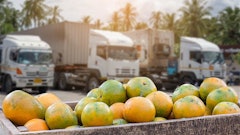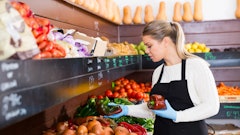An individual applies for a job in the warehouse at ABC Food Co. He has a Social Security card and driver’s license. His application lists employment in another part of the country for a company that went bankrupt six months ago. He seems clean-cut and well-spoken, and claims to be a hard worker. He is hired.
Unfortunately, everything about him is fraudulent. The Social Security card and driver’s license were obtained on the Internet. His former company is fictitious. He is a hard worker, but his work is in terrorism. His new job provides unfettered access to inventory. And his goal is to contaminate product that will flow through the supply chain to the kitchen table. The end result: panic and terror.
“It is extremely difficult to protect the food supply,” says Barry Brandman, president of Danbee Investigations in Midland Park, NJ, who gives the industry an overall “B” rating for its efforts so far. A lot of good work has been done, he hastens to add, but a lot more is needed.
Help is on the way in the form of a group of government agencies. The U.S. Department of Agriculture, Department of Health and Human Services, Food and Drug Administration, Department of Homeland Security and the Federal Bureau of Investigation will start collaborating with states and private industry to protect the nation’s food supply from terrorist threats. The Strategic Partnership Program Agroterrorism (SPPA) Initiative supports President Bush’s requirements directing the government to work closely with states and industry to enhance the security of the nation’s food supply from farm to kitchen table.
“As one of the lead federal agencies charged with protecting our nation’s food supply, the FDA fully supports this initiative, encouraging a closer working relationship with our partners in federal and state government, as well as the private sector, to make the nation’s food supply even safer,” says FDA Commissioner Dr. Lester Crawford. “This partnership brings together all of the organizations that have the best knowledge and abilities in safeguarding the food we eat.”
Road Show
Over the next year, teams of federal and state officials will travel to all 50 states to meet with executives working in all parts of the food chain. They will discuss security issues and consider ways to better protect the food supply. Government officials will learn first hand about the special protection needs of the food industry.
Much of this input will come from the various trade associations representing food manufacturers, distributors and retailers. Collectively, they have set up programs for their members that provide advice on security and encouragement to protect against all threats.
“The food retail and wholesale industry continues to work closely with the government and intelligence community to develop strategies for preventing terrorist attacks to the nation’s food supply and to prepare a coordinated response if such an event should occur,” says Tim Hammonds, president and CEO of the Food Marketing Institute, Washington. “FMI has been working across the entire food supply system—from farm to table—to assess the highest risk areas and establish the practical steps that need to be taken to minimize the industry’s vulnerability.
“The focus of FMI’s efforts is a public/private outreach network known as the Food and Agriculture Information Sharing and Analysis Center (ISAC), an important mechanism for quickly distributing warnings and alerts from government agencies such as the Department of Homeland Security or the FBI. The ISAC also provides companies with a forum for reporting confidential watch and information tips to necessary security agencies.”
The Food Products Association, Washington, has added an independent security consultant to its staff to advise members on security matters. Also, FPA is currently revising and updating its food security manual first published in November 2002.
Mark Allen, president and CEO of the International Food Service Distributors Association, Falls Church, VA, says, “IFDA and our foodservice distributor members have worked together with government agencies to improve communication between the industry, regulators and law enforcement and to address terrorist-related security concerns. In light of this new threat, distributors have taken a number of steps in physical plant security and tightening access to facilities and trucks. Simpler steps include improved delivery driver identification for the customer’s benefit.”
The Grocery Manufacturers Association, Washington, has served its members since 2001 by providing them information on protecting their facilities, improving security procedures and keeping current with the latest bioterrorism regulations from the government. Part of the effort has been an initiative called Project Vigilance, which allows companies to share with other members what they have done to upgrade security.
Focus On Best Practices
The actions of one of GMA’s members provide a snapshot of how responsible food companies are preparing themselves to deter possible acts of agroterrorism. The focus on security at Land O’Lakes is solid and steadily improving in the areas of policy, process and prevention.
“As a food company, we have always taken our food safety responsibility seriously all the way through our supply chain,” says Pat Johnson, manager of logistics at the Arden Mills, MN-based dairy company. “But the emphasis has shifted a little from temperature control, preventing theft and ensuring wholesomeness to eliminating the possibility of unauthorized access to our products.”
Johnson declined to reveal specific supply chain security initiatives, but the company has examined its processes end to end and spent significant time and money in the plants, warehouses and transportation areas to ensure maximum protection. Carriers are required to padlock all loads and truck seals have been upgraded from a “foil” unit to a one-use cable seal, which is more expensive but much more difficult to remove.
“We are actively looking for and evaluating shipper ‘best practices’ on an ongoing basis and will continue to look for ways to make our supply chain more secure,” he says.
That’s a good idea because of the nature of the food supply chain, according to Brandman, the safety consultant.
“There are a number of vulnerabilities,” he says. “All you need to do is take apart the supply chain and look at the flow of product and the number of entities that handle the goods” from the manufacturing plant to the supermarket shelf. “Product is going to be exposed. There’s no way that you can put food in a bubble from the time that it comes out of the ground or a processing facility to the time that it goes into a consumer’s shopping bag. And that’s not going to change.”



























